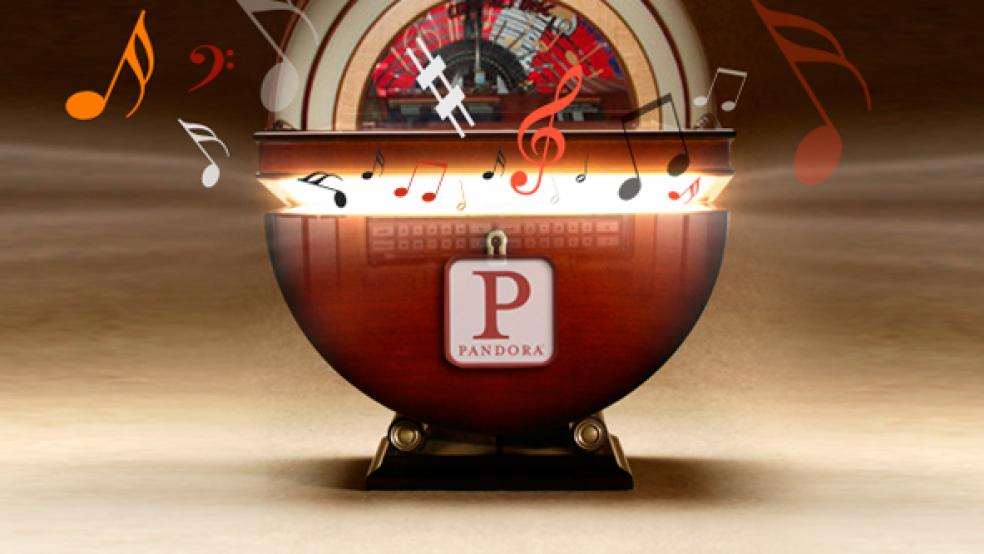This morning’s IPO of Internet radio service Pandora was an important test of whether investors continue to clamor for tech stocks. The company’s shares were initially priced at $16, and quickly rose to $23.15, up 44.7%. That valued the company, which had never turned a profit, at $2.56 billion. By early afternoon, the Dow was down close to 200 points, and Pandora's stock had dropped to $18 Pandora’s initial offering follows the stunning success of LinkedIn’s IPO, which saw shares double from an initial price that was already 40 percent higher than market watchers expected.
Based on first-day sales, LinkedIn was valued at $4.3 billion, the largest valuation for a U.S. Internet company since Google went public. LinkedIn’s IPO has fueled an investor frenzy over other tech darlings that are expected to go public in coming months, such as Groupon (estimates of its potential valuation have hit $25 billion), Twitter, Zenga, Foresquare, and ultimately the big dog of all social media stocks, Facebook. These social media companies are being assigned valuations as high as 100 times revenue, or more.
So how worried should we be about another tech bubble?
Plenty of experts say this isn’t a bubble at all –that today’s investors are hungry for growth opportunities and better at valuing Internet stocks than they were before the last tech crash in 2000.“I would put myself in the class of bubble skeptics,” says Luke Taylor, a Wharton finance professor. “People have knee-jerk reactions when they call something a bubble … It’s a name for something that we haven’t taken the time to understand.”
Michael Arrington on TechCrunch scoffed at the idea in an April article: “If there’s any evidence of said bubble all the press will eat it up,” he wrote. “Mostly because they were out buying Internet stocks in 2000 instead of doing their jobs and reporting on the fairly obvious signals that the Nasdaq was about to implode. They won’t get caught with their pants down and their hand out again.”
Certainly, the experience of a couple of companies doesn’t signal a bubble. But when experts start publically proclaiming that we’re not in a bubble, it’s usually time to start worrying about one. And a closer look at the specifics of Pandora’s business raises doubts about the IPO’s warm reception. "For a company that is not yet profitable, that [valuation] is extraordinarily demanding," Anupam K. Palit, a senior equity analyst at GreenCrest told The Wall Street Journal.
Sure, Pandora has 90 million registered users, easily making it the top internet radio platform in the US, proof that it is a very popular service. But the company has no clear business model and to date no sign of a viable one in the near future. The company lost $16.8 million on $137.8 million in revenue in 2010.
And while the company’s blistering traffic growth is impressive – it adds a new user every second – the cost of maintaining and upgrading its software grows along with the number of users. Similarly, as its user base grows, the service must pay increasing royalties to music publishers. To keep up with those rising costs, Pandora must increase the number of its ad impressions, but risks alienating users who are annoyed by the ads. Its challenges will only grow as online radio moves to mobile devices, where ad revenue is even harder to come by. To top it off, there is no shortage of new, Pandora-like services crowding into the market, including LastFM, Spinner, and Groove Shark.
(There are also grim implications for the already wounded music industry, which is still searching for a business model in the wake of the digital music revolution. Who will buy CDs when you can play any song you want, anytime, through your phone? But that’s another story.)
All the questions about bubbles and crazy valuations won’t be answered until companies like Facebook and Twitter go public. If the massively popular but questionably profitable platforms hit the estimates about their valuations, talk of a bubble will end. Until then, investors might want to take a break from listening to Pandora and remember that adorable sock puppet from Pets.com, now a symbol of the last dot.com crash.
Additional reporting for this story by Karlee Weinmann
Related Links:
What comes After the Pandora IPO? (Forbes.com)
Tech Bubble (The Economist)
Pandora’s Shares Jump (The Wall Street Journal)

